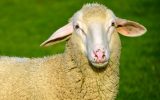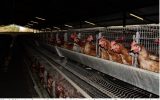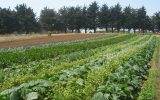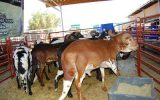The donation of the hydroponic fodder production unit came as a result of the MOU, which was signed between the University of Namibia, Namibia National Farmers Union (NNFU) and AGRITECH in 2019. The hydroponic fodder production unit was warmly welcomed by the staff members and students from Neudamm campus.
During the hand out, Dr Theopoline Amushendje, Deputy Dean: FANR was delighted that the campus could receive such a structure and support from NNFU and AGRITECH. Dr Theopoline expressed that; to contribute to the overall development of the agricultural sector in our country and continent, all key players must work together; including government, private sectors, civil society, NGOs, national farmers unions, innovators, entrepreneurs, students and others. The department promised that they will put the equipment into good use and through this unit, they will assist livestock farmers in Namibia, to be able to cope with animal feed shortage, especially because Namibia is prone to drought conditions. As a result, with the help of the hydroponic fodder structure, the institution will focus on some key research areas such as; the nutritional contents of the fodder produced through hydroponic techniques; preservation methods of the hydroponic fodder; barley production and the possibility of using other cereals instead of barley.
In addition, the UNAM research will also focus on; Biomass production from different cereals – barley, maize, pearl millet, sorghum; Cereal-Legume hydroponic fodder yield and its nutritive value; Animal response when fed hydroponic fodder as supplement – growth, milk production; The quality of products from animals fed hydroponic fodder; Control of fungal growth in hydroponic fodder production and Hydroponic fodder production water use efficiency.
Prof J. Mupangwa from the department of animal science was also present at the hand out and this is what he had to share, according to him; globally, hydroponic fodder production has become increasingly popular as it may be more competitive than classical agricultural production in certain contexts. While commonly viewed as high-tech or even prohibitively expensive technology it can be in fact established by producing the equipment using locally available materials and manufacturing capacities and can be competitive way of producing fodder. The NNFU/Agritech Hydroponic fodder Programme is a proof of that. However, by using simple locally available materials it becomes difficult in controlling temperatures, humidity, and environmental contamination of the hydroponic unit. It is therefore important to contact controlled research to determine the hydroponic fodder production from such low cost units.




















